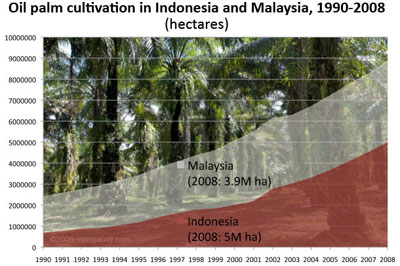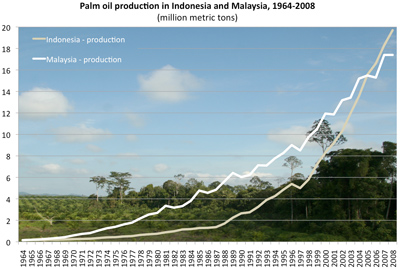Rapid expansion of oil palm plantations across Southeast Asia have run roughshod over customary tenure systems, resulting in exploitation of local communities, conflict, and outright human rights abuses, reports a new assessment of the palm oil sector by the Forest Peoples Programme (FPP), an international indigenous rights group.
The report, Palm oil and indigenous peoples in South East Asia, concludes that the rapid growth of the palm oil industry has outpaced safeguards, especially in Indonesia and Malaysia.
“The global market for palm oil is thus driving a process of rapid land acquisition in the form of consolidated blocks of land, a demand which is testing the capacity of local land agencies, administrators and legislatures to the limits and beyond,” states the report, which is authored by Marcus Colchester, director of FPP. “Regulations and procedures, which evolved to deal with small-scale, often informal, domestic land markets, are proving unequal to the challenge posed by this global demand for huge areas of land.”
The report runs through a litany of cases in Malaysian Borneo, Kalimantan, Sumatra, and Papua where native peoples’ rights have been compromised or ignored in the interest of establishing new plantations. The report notes that while all members of affected communities are impacted, women, in particular, are losing out under current practices.
 Click to enlarge |
“Whereas under customary law lands may be held by women (as among the Minangkabau in
West Sumatra) or equally by men and women (as among most Dayak peoples in
Borneo), when they get formal titles as smallholders these are vested in male heads of
households,” the report states. “The marginalization of women has been cited as a cause of the increased
instances of prostitution in oil palm areas. According to the Indonesian Ministry of
Women’s Empowerment, the impact of oil palm plantations on rural women can
include: an increase in time and effort to carry out domestic chores through the loss of
access to clean and adequate water and fuel wood and an increase in medical costs
due to loss of access to medicinal plants obtained from gardens and forests; loss of
food and income from home gardens and cropping areas; loss of indigenous
knowledge and socio-cultural systems and; an increase in domestic violence against
women and children due to increased social and economic stresses.”
The report says that efforts to address injustices have been held up by corrupt courts, weak land laws, and unresponsive local governments, including that of Sarawak, which has continued to block restitution in a case where a judge found that developers had “violated the indigenous
peoples’ rights to both life and property which are guaranteed under Articles 5 and 13
of the Federal Constitution.”
The report concludes by evaluating the prospects for real reform in Indonesia’s forestry and
plantations sectors under the recently signed reducing emissions from deforestation and degradation (REDD) agreement with Norway.
 |
“If… there is to be a real moratorium on land clearance then this may provide
an important opportunity for the Government to effect reforms in the forestry and
plantations sectors, take firm steps to amend the laws so they recognize indigenous
peoples’ rights and adopt a more measured approach to rural development that gives
priority to local communities’ initiatives and not the interests of foreign backed
companies,” Colchester writes.
“If REDD is neither
going to respect indigenous peoples’ rights nor curb palm oil expansion, it would
seem to be a hollow promise.”
Palm oil and indigenous peoples in South East Asia
Related articles